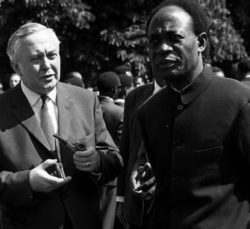African Knowledges and Contemporary FinTech in Africa: Interview with Dr Scott Timcke

In 2021 Dr Scott Timcke was awarded a fellowship in the LUCAS/LAHRI Virtual Research Fellowship Scheme about African Knowledges for Global Challenges. On completion of his Fellowship we interviewed Scott about his research on 'How can African Knowledges Aid in the Analysis of Contemporary FinTech in Africa?'.
Please briefly introduce yourself
My name is Scott Timcke, I am a comparative historical sociologist who studies race, class, and technology in modernity. After completing my initial studies in African politics at The University of Witwatersrand in South Africa, I enrolled for a PhD at Simon Fraser University in Canada to pursue my interest in science and technology studies. Thereafter I worked as an academic at The University of The West Indies, St-Augustine in Trinidad and Tobago and presently I am a research associate with the University of Johannesburg’s Centre for Social Change in South Africa. During 2021 I have been fortunate to be part of Leeds University Centre for African Studies fellowship cohort looking at how African knowledges can be leveraged to address global challenges.
What project have you worked on during your fellowship period?
After writing two books on aspects of US imperialism, both its origins in long institutional antecedents in genocide, enslavement, and accumulation by dispossession, as well as newer mechanisms like computationally aided global dragnet surveillance, drone-warfare, and profit-seeking in protracted conflicts abroad, I felt compelled to study how this general climate in international political economy shaped the prospects for African social development, especially in the digital realm.
My approach to this task has been to draw together two different sets of literature, African studies and critical data studies. Now certainly these are big areas that require careful synthesis, so the project is very much step-by-step. For the fellowship I’ve focused on researching the neocolonial aspects of FinTech platforms, both those that have some legacy like Safaricom’s M-Pesa in Kenya as well as neobanks like TymeBank in South Africa as these platforms work within the parameters of neoliberalism.
What are the findings of your project so far?
The convergence of finance and data has generated considerable enthusiasm in development circles about the promise of connectivity and FinTech to improve quality of life and create wealth on the African continent. This promissory sentiment about connectivity and financial inclusion promoted by entities like World Economic Forum and Meta (previously Facebook) focuses on building the infrastructure to create markets and customers. By ordinary operation these markets are said to bridge the digital divide between the Global North and the Global South. However, these conceptualizations typically fail to consider the strong scholarship around uneven and combined development which shows that some places are poor because other places are rich. Furthermore, the problem of drainage—the looting of African resources and intense exploitation of Africa labour by imperial powers that led to global inequality—remains a feature of digital society, most visible in the indebtedness that consumer orientated FinTech platforms encourage through their code and review of analytics. Altogether these are processes that scholars like Dan Kotliar and Abeba Birhane have in mind when they write about data orientalism and the algorithmic colonization of Africa respectively.
Due to its leadership and associated faculty, as expected the Centre for African Studies has proved to be a conducive environment to study the African experience of algorithmic capitalism. This has led to several outputs, the most important of which are two papers submitted to academic journals, but also some essays in venues like the roape.net and Africa Is a Country. I have also co-authored an essay with University of Leeds faculty Jörg Wiegratz, and Chris Paterson on the securitisation of capitalist rule in Africa. Finally I made a guest appearance on Christopher Till’s Digital Sociology podcast to speak about some of these ideas; he has a great archive that I highly recommend.
How does the project speak to the overall theme of “African knowledges for global challenges”?

My central argument is that notwithstanding the deep changes to the world during the late 20th and early 21st century, especially around the impact of technology, ideas like Kwame Nkrumah’s critique of neocolonialism remains extremely relevant for the analysis of present-day algorithmic capitalism in Africa. Perhaps to put it slightly differently, while there is considerable innovation in contemporary African studies, there is also considerable value in revisiting classical African scholarship to appreciate the continuities and changes in imperialism, regardless of whether it originates in Europe or North America.
Is there anything you would like to add?
Please check out two of my recent book-length studies, in which I further develop some of the ideas mentioned above:
Scott Timcke, Algorithms and the End of Politics: How Technology Shapes 21st-Century American Life. Bristol University Press 2021.
Scott Timcke, Capital State Empire: The New American Way of Digital Warfare. University of Westminster Press 2017.
